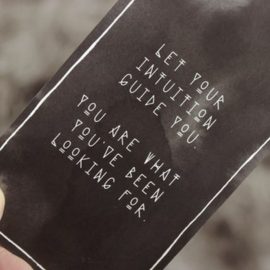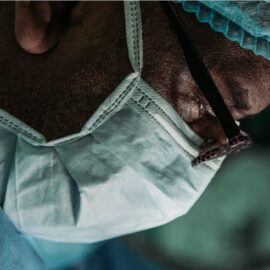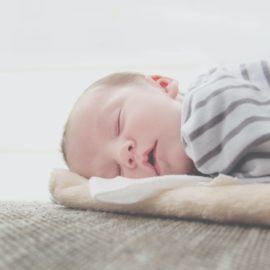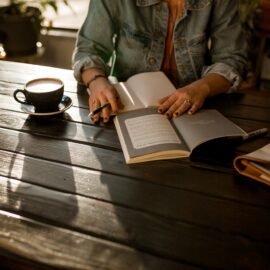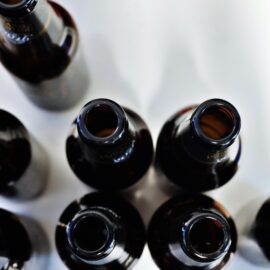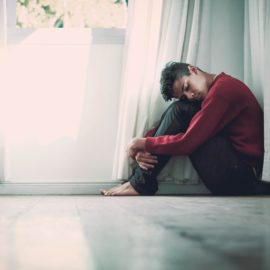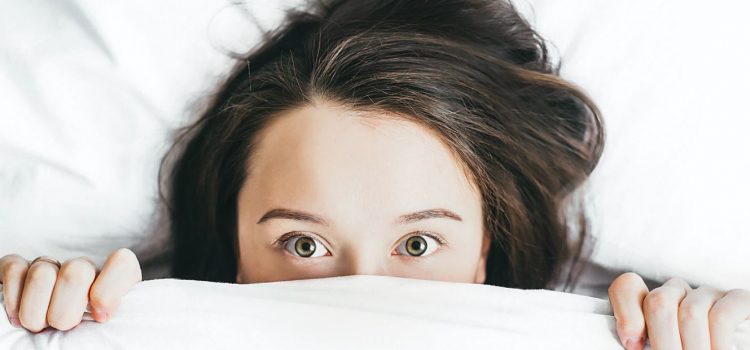
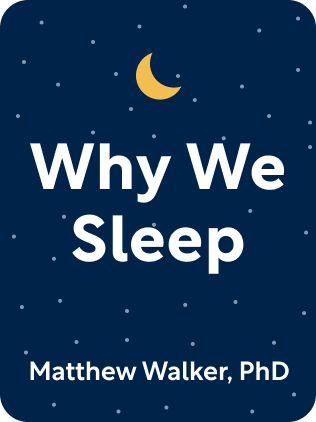
This article is an excerpt from the Shortform summary of "Why We Sleep" by Matthew Walker. Shortform has the world's best summaries of books you should be reading.
Like this article? Sign up for a free trial here .
Do you have trouble sleeping at night? What affects sleep that you should avoid before bed?
Many people struggle to get a proper night’s sleep. There are five main influences that drastically affect how we sleep: caffeine, light, temperature, alcohol, and alarms.
Keep reading to learn about each factor and for tips on how to improve your quality of sleep.
1) Caffeine
In the book How We Sleep, Matthew Walker discusses what affects sleep. First, Walker explains that caffeine blocks adenosine receptors, thus reducing how much you feel sleep pressure, or the desire to sleep. If you ever drink coffee and then feel a crash later, this comes from the caffeine wearing off and leaving you with the adenosine that’s been increasing all day. Walker provides some information to help you make smarter choices about your caffeine consumption:
- Caffeine has a half-life of five to seven hours, which means it takes 10 to 14 hours to flush out of your system completely. Walker notes that some people metabolize caffeine more quickly than others—it depends on your genetics and the amount of cytochrome P450 enzyme in your liver. (Shortform note: Unfortunately, there is no instant way to instantly flush out caffeine from your body, but you may be able to make your body more efficient at reducing caffeine’s half-life in the long run by eating more cruciferous vegetables like broccoli.)
- Walker warns to be careful when drinking decaf, as it can contain 3-10% of the caffeine found in regular coffee—it’s not caffeine-free. (Shortform note: It’s hard to know how much caffeine your drink actually has because companies aren’t required to list caffeine content on their food and beverage labels.)
- Keep in mind that caffeine doesn’t just come from coffee, so you may be ingesting caffeine without realizing it. It’s also in some soft drinks, some teas, and chocolate. (Shortform note: Black and green teas contain nearly a third of the caffeine in coffee. Another source of caffeine is energy drinks, which not only contain nearly the same amount of caffeine as coffee but also have high amounts of sugar and artificial additives.)
- Caffeine exposure during childhood could reduce NREM sleep, delaying brain maturation and learning. (Shortform note: The U.S. doesn’t have any guidelines for children’s caffeine consumption, but Canada recommends a range from 45 mg or half a cup of coffee for those aged four to six, to 85-100 mg for adolescents.)
Tip to Manage Caffeine Intake
Walker says that if you must have caffeine, don’t drink it in the afternoon, and definitely not in the hours before sleep.
(Shortform note: If you can’t shake the habit of drinking a hot beverage late in the afternoon or in the evening, try replacing your coffee or black or green tea with an herbal alternative. Studies suggest that the following herbal teas may help promote sleep and relaxation: valerian root, chamomile, lavender, lemon balm, passionflower, and magnolia bark.)
2) Light
Light helps the suprachiasmatic nucleus regulate the circadian rhythm. In the natural world, sunset—or the onset of darkness—sends a signal to the pineal gland to secrete sleep-inducing melatonin. Walker points out that nowadays, artificial light bathes our homes and disrupts our circadian rhythm.
Any light is disruptive to the circadian rhythm. Electric light delays your 24-hour circadian rhythm by two to three hours each evening.
- Even 8-10 lux (a measure of light intensity) delays melatonin release. For reference, a bedside lamp is 20-80 lux, and a typical living room is 200 lux, suppressing melatonin by 50%. (In comparison, the full moon only provides about 0.1 lux.)
Walker emphasizes that blue light is most problematic, suppressing melatonin at twice the levels of warm light. Blue light is most emitted by digital screens like TVs, computer monitors, and smartphones.
- We respond most to blue light because we evolved from marine creatures, and blue light penetrates water best.
- Reading on an iPad versus reading a book leads to 50% less melatonin secretion and delays the rise of melatonin by three hours.
Tips to Reduce Light Exposure
- Dim lights in the rooms where you spend your evenings.
- Maintain complete darkness throughout the night, using blackout curtains.
- Use settings on your phone and computers to tint the screen orange, reducing blue light.
- Consider yellow-tinted glasses that block blue light.
(Shortform note: Blue light may have an even bigger impact on children, as they’re more sensitive to light and have bigger pupils. While the same tips apply to children, you can go a step further by implementing gadget-free time an hour before bed and storing their devices outside their bedroom at night.)
3) Constant Temperature
In natural environments, the temperature rises and falls with the day. This is used by the hypothalamus, along with light, to set the circadian rhythm. Our bodies react in kind—before sleep, the body cools, ejecting heat through densely perfused areas like your hands, feet, and face.
But in modern times, we use thermostats to homogenize our temperatures, suppressing the highs in the day and raising the lows with pajamas and blankets. Our brain doesn’t get the same signal about the day’s cycle that it used to.
Cooling your body temperature improves sleep. Walker mentions an experimental treatment during which people wear a bodysuit that circulates cool water. Among insomniacs and the elderly, this reduces time to sleep and increases the quality of NREM sleep.
Tips to Cool Down at Night
- The best temperature to sleep at with standard bedding and clothing is 65F, which is far lower than most people keep bedrooms.
- Try activities that help remove heat from the body, such as taking a hot bath before bed (this expands capillaries, which then drops body temperature), splashing water on your skin, or sticking your hands and feet outside your blanket.
| How to Sleep When It’s Just Too Hot If you live in a tropical country or are in the middle of summer with no access to air-conditioning to cool your bedroom to an optimal temperature, you can increase your chances of getting a good night’s sleep with these tips: Avoid exercising at night. Exercising at night can raise your body temperature, making you feel even warmer, so save your workout for the morning. Avoid anything spicy. A dinner of spicy food can make you sweaty and uncomfortable. Keep your room cool throughout the day. This means drawing the drapes shut during the day, using a fan to circulate air, and keeping heat-generating appliances and devices—like computers—out of the room. Chill out. Stashing your pillowcases in the fridge or putting a hot water bottle filled with cold water in your pillow might help. |
4) Alcohol
Alcohol is a sedative, causing what appears to be sleep but is really more like anesthesia. It causes you to wake up throughout the night and prevents you from getting REM sleep.
In the process of metabolizing alcohol, your body produces aldehydes, chemicals that suppress REM sleep. Alcoholics are so sleep-deprived that their brain imposes REM-like behavior during wakefulness—resulting in hallucinations and scattered thinking. (Shortform note: An unfortunate vicious cycle can result here—alcohol disrupts sleep, which causes more fatigue and less behavior control when awake, which prompts more alcohol.)
Even for non-alcoholics, alcohol disrupts the normal processes of learning and complex knowledge when disrupting REM sleep.
- Walker discusses an experiment in which subjects were tasked with learning a new grammar on day 1. When exposed to alcohol on the first night, they lost 50% of memory recall compared to the abstinent group. Surprisingly, those getting alcohol on night 3 lost 40%—damage can occur for memories days past.
Tip to Avoid the Effects of Alcohol
Walker encourages total abstinence from alcohol. A drink takes hours to fully degrade and excrete, and it’s even worse for people with alcohol flush reactions.
(Shortform note: A less puritanical approach comes from The Sleep Foundation, which recommends that you stop drinking alcohol at least four hours before bedtime. It’s worth noting that women seem to be affected earlier and with lower doses of alcohol than men. This is because they tend to weigh less and have less water in their bodies, leading to higher blood alcohol concentrations in their bodies.)
5) Alarms
Alarms cause acute stress responses when you wake up, spiking cortisol, heart rate, and blood pressure. This is not good for you. Even worse, snoozing the alarm causes multiple stress responses in quick succession.
Walker suggests several tips to lessen the stress of waking up:
- The best path to waking is natural, without alarms.
- Wake up at the same time of day every day. Commit to waking up when you hear the alarm to avoid snoozing.
(Shortform note: One study suggests that changing your alarm from a jarring sound to an upbeat song can help combat sleep inertia, that disoriented state you’re in upon waking up. But waking up naturally is still the better option—one survey found that natural wakers tended to feel more well-rested throughout the day, were more positive and productive, and made healthier choices.)

———End of Preview———
Like what you just read? Read the rest of the world's best summary of Matthew Walker's "Why We Sleep" at Shortform .
Here's what you'll find in our full Why We Sleep summary :
- Why you need way more sleep than you're currently getting
- How your brain rejuvenates itself during sleep, and why nothing can substitute for sleep
- The 11-item checklist to get more restful sleep today

